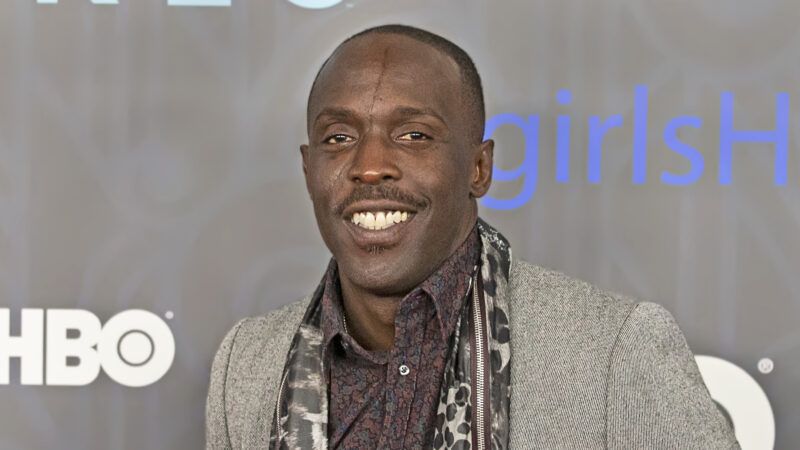Michael K. Williams' Death Sparks Charges Against Drug Dealers
The actor's overdose death was a tragedy, but overzealous prosecution of the dealers who sold him the drugs will only make the problem worse.

In September, actor Michael K. Williams, best known for his nuanced portrayals of gangsters in T.V. dramas like The Wire and The Night Of, passed away. His death was determined to be the result of an overdose of heroin which had been laced with fentanyl, a synthetic opioid that is significantly more potent. Earlier this week, federal prosecutors in New York charged four men with selling Williams the fatal mix. The man who actually made the exchange, Irvin "Green Eyes" Cartagena, was additionally charged with causing Williams' death. But while Williams' death was tragic, throwing the book at his dealers will not have the effect that prosecutors intend.
On Wednesday, the same day news outlets reported the arrests, The Daily Beast published a lengthy account of the investigation which led to the four arrests. The article draws heavily from interviews with police, who relay the actor's movements during his final hours in granular detail. Deputy Chief John Chell recalled that he advised the investigating precincts, "Treat this case as if Michael K. Williams was hit by a bullet. Make believe he got shot."
Upon determining where and from whom Williams bought the drugs, the officers made a consequential decision:
To make a state case against the crew for death by dealer, the detectives would have needed to prove that the crew was aware that the particular dose sold to Williams would likely be fatal. Federal law, on the other hand, requires only proof that the user died as a result of what the dealer provided. So the detectives went to the U.S. Attorney for the Southern District of New York, which had successfully prosecuted a number of such cases.
Armed with this lower standard of proof, as well as a mandatory minimum sentence of 20 years in prison for "selling narcotics that result in a death," police successfully carried out the arrests. The article quotes Detective Ramon Rodriguez, one of the investigators, bemoaning that when he had arrested Cartagena for dealing a month before Williams' death, it was dispiriting "[t]o see him go through the system and come right out."
But it is far from clear whether this arrest will have the intended effect of disincentivizing future drug dealers. Historically, when the penalties for dealing in illicit narcotics increase, operators within black markets do not pull back; they simply pass those costs on to the consumer. In fact, higher penalties can even encourage riskier behavior: In places like Indonesia, where the penalty for trafficking can include death, traffickers trick or coerce innocent people into acting as mules on their behalf. In a risk-reward calculus where the risk includes death, and the reward includes huge profits, extortion is just another cost of doing business.
It is also frequently the case that laws intended to crack down on dealers and traffickers are applied to addicts and users. In 2019, a woman was sentenced to 21 years in prison for distributing heroin that killed someone, despite the fact that the two of them were using that heroin together. (The conviction was thrown out, but only after two years and with the prospect of a retrial.) Increasingly, prosecutors are applying these statutes to drug users when another user dies, regardless of if the survivor being prosecuted knew that the drugs were tainted.
Then there is the irony of the federal government pursuing charges over fentanyl-laced heroin when one of the primary reasons that this more potent mixture has proliferated over the years is that same government's War on Drugs. Crackdowns on painkillers led patients to seek remedies elsewhere, and bans on substances incentivize dealers to traffic in substances of higher potency. And of course, when the entire enterprise is forced to take place underground, there is no way for a user to ensure that what he is buying will be safe to consume. Like Prohibition before it, the War on Drugs is actively harmful to the people it purports to protect.
Ironically, one person who understood this backward dichotomy was Williams himself. In 2016, Williams penned an op-ed for CNN in which he characterized the War on Drugs as "a war on people," with "devastating…effects" especially on "black and brown Americans." Williams wrote that while he had struggled with addiction throughout his life, he considered himself "lucky," as he was "able to get the help and treatment I needed." He acknowledged that "I realize that no one's life, least of all mine, would have been safer, better or more productive if I had been jailed for my addiction issues."
Williams' death was a tragic loss: a truly talented performer who was open about his struggles yet ultimately succumbed to them. It is entirely possible that if, as alleged, the dealers in question knew Williams' mix was tainted when they sold it to him, then some sort of charges of criminal negligence could be appropriate. But by dangling a decades-long federal sentence, police are not only failing to address the very real issues which cause these tragedies to occur, they are actively creating the conditions which make them worse.


Show Comments (19)